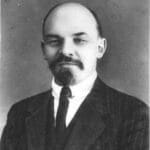About the text:
From: V.I. Lenin: On Imperialism and Opportunism, Futura 1974, 103 p., pp. 26-28.
(Extract)
Written May-June, 1915.
Published in 1915
in “Kommunist” No. 1-2.
(…)
VII
(…)
By social-chauvinism we mean acceptance of the idea of the defence of the fatherland in the present imperialist war, justification of an alliance between socialists and the bourgeoisie and the governments of their “own” countries in this war, a refusal to propagate and support proletarian-revolutionary action against one’s “own” bourgeoisie, etc. It is perfectly obvious that social-chauvinism’s basic ideological and political content fully coincides with the foundations of opportunism. It is one and the same tendency. In the conditions of the war of 1914-15, opportunism leads to social-chauvinism. The idea of class collaboration is opportunism’s main feature. The war has brought this idea to its logical conclusion, and has augmented its usual factors and stimuli with a number of extraordinary ones; through the operation of special threats and coercion it has compelled the philistine and disunited masses to collaborate with the bourgeoisie. This circumstance has naturally multiplied adherents of opportunism and fully explains why many radicals of yesterday have deserted to that camp.
Opportunism means sacrificing the fundamental interests of the masses to the temporary interests of an insignificant minority of the workers or, in other words, an alliance between a section of the workers and the bourgeoisie, directed against the mass of the proletariat. The war has made such an alliance particularly conspicuous and inescapable. Opportunism was engendered in the course of decades by the special features in the period of the development of capitalism, when the comparatively peaceful and cultured life of a stratum of privileged workingmen “bourgeoisified” them, gave them crumbs from the table of their national capitalists, and isolated them from the suffering, misery and revolutionary temper of the impoverished and ruined masses. The imperialist war is the direct continuation and culmination of this state of affairs, because this is a war for the privileges of the Great Power nations, for the repartition of colonies, and domination over other nations. To defend and strengthen their privileged position as a petty-bourgeois “upper stratum” or aristocracy (and bureaucracy) of the working class – such is the natural wartime continuation of petty-bourgeois opportunist hopes and the corresponding tactics, such is the economic foundation of present-day social-imperialism. And, of course, the force of habit, the routine of relatively “peaceful” evolution, national prejudices, a fear of sharp turns and a disbelief in them – all these were additional circumstances which enhanced both opportunism and a hypocritical and a craven reconciliation with opportunism – ostensibly only for a time and only because of extraordinary causes and motives. The war has changed this opportunism, which had been fostered for decades, raised it to a higher stage, increased the number and the variety of its shades, augmented the ranks of its adherents, enriched their arguments with a multitude of new sophisms, and has merged, so to say, many new streams and rivulets with the mainstream of opportunism. However, the mainstream has not disappeared. Quite the reverse.
Social-chauvinism is an opportunism which has matured to such a degree that the continued existence of this bourgeois abscess within the socialist parties has become impossible.
Those who refuse to see the closest and unbreakable link between social-chauvinism and opportunism clutch at individual instances – this opportunist or another, they say, has turned internationalist; this radical or another has turned chauvinist. But this kind of argument carries no weight as far as the development of trends is concerned. Firstly, chauvinism and opportunism in the labour movement have the same economic basis: the alliance between a numerically small upper stratum of the proletariat and the petty bourgeoisie – who get but morsels of the privileges of their “own” national capital – against the masses of the proletarians, the masses of the toilers and the oppressed in general. Secondly, the two trends have the same ideological and political content. Thirdly, the old division of socialists into an opportunist trend and a revolutionary, which was characteristic of the period of the Second International (1889-1914), corresponds, by and large, to the new division into chauvinists and internationalists. (…)
LCW vol. 21, pp. 242-244.
The full text can be found online on Marxist Internet Archive:
https://www.marxists.org/archive/lenin/works/1915/csi/index.htm


























